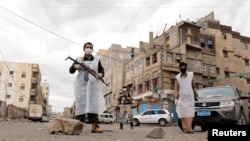The United Nations warns COVID-19 could have catastrophic consequences for millions of people in Yemen, and worsen what is already the world’s worst humanitarian crisis. The latest World Health Organization figures put the number of cases in Yemen at 184, with 30 deaths, but experts think the number is grossly underestimated.
Epidemiologists studying the situation in war-torn Yemen warn the coronavirus could spread faster, more widely and with deadlier consequences than in many other countries.
The U.N. Office for the Coordination of Humanitarian Affairs (OCHA) says aid agencies are working on the assumption that community transmission is taking place across the country.
OCHA spokesman Jens Laerke told VOA aid workers are limited in what they can do to help people who fall ill with COVID-19. He said tests are in short supply as is medical and other essential equipment. He said aid agencies report a serious lack of water and sanitation, critical for handwashing to prevent the virus from spreading.
“We hear from many of them that Yemen is really on the brink right now. The situation is extremely alarming. They are talking about that the health system has, in effect collapsed. They are talking about having to turn people away because they do not have enough oxygen, they do not have enough personal protective equipment,” he said.
Laerke noted aid programs in health, water and sanitation, and nutrition, among others, are crucial in protecting millions of people from becoming infected with the virus. But he said the U.N. is broke, noting that more than 30 key programs risk closing in the coming weeks because money is running out.
“We are heading towards a fiscal cliff. If we do not get the money coming in, the programs that are keeping people alive and are very much essential to fight back against COVID will have to close. And, then the world will have to witness what happens in a country without a functioning health system battling COVID-19. And, I do not think the world wants to see that,” he said.
Laerke added that the U.N. has received $677 million to run its humanitarian programs in Yemen this year, compared to more than $4 billion last year.
The U.N. and Saudi Arabia will co-host a virtual pledging event on June 2 to raise funds to maintain humanitarian operations. The U.N. says it will need at least $2 billion between now and the end of the year to provide life-saving assistance, including COVID-19 prevention and treatment programs.




